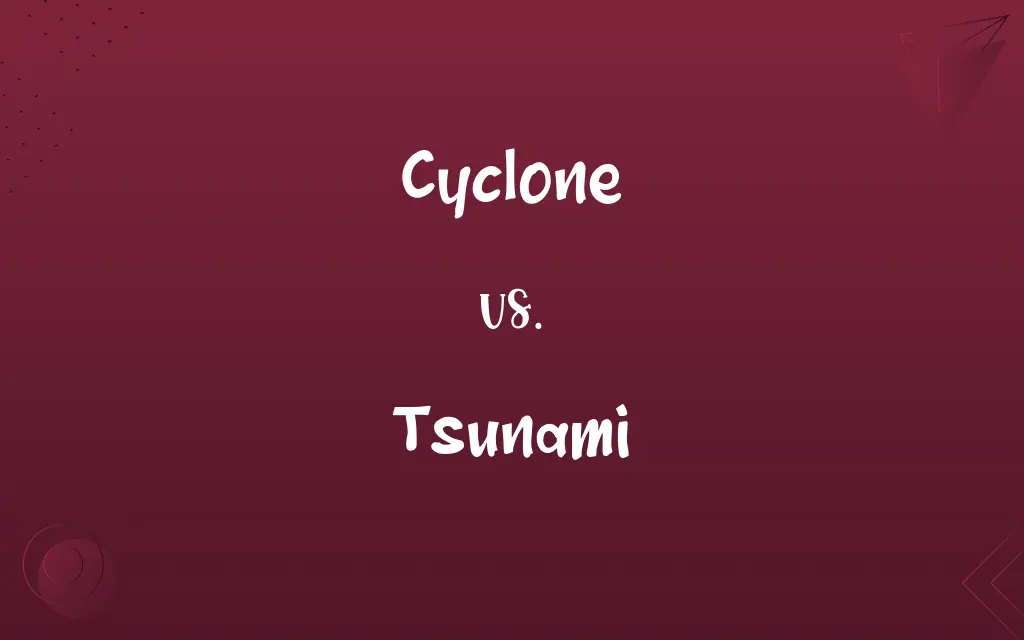Cyclone vs. Tsunami: Know the Difference

By Shumaila Saeed || Updated on December 25, 2023
A cyclone is a large-scale air mass rotating around a strong center of low atmospheric pressure, while a tsunami is a series of ocean waves caused by underwater disturbances such as earthquakes.

Key Differences
A cyclone is characterized by rotating wind systems caused by atmospheric disturbances, often leading to heavy rains and strong winds. In contrast, a tsunami is a series of high ocean waves typically triggered by seismic activities like earthquakes or volcanic eruptions.
Shumaila Saeed
Nov 16, 2023
Cyclones form over warm ocean waters and can vary in size and intensity, sometimes developing into hurricanes or typhoons. Tsunamis, however, are not related to weather patterns but are caused by sudden displacements in the ocean floor, leading to powerful and fast-moving waves.
Shumaila Saeed
Nov 16, 2023
The impact of a cyclone is usually confined to coastal areas and can cause extensive wind damage and flooding. A tsunami, on the other hand, can affect entire coastlines, with waves traveling long distances across oceans, causing widespread destruction upon reaching land.
Shumaila Saeed
Nov 16, 2023
Cyclones are tracked and predicted by meteorological agencies using satellite and radar technology, enabling early warning systems. Tsunamis, while also monitored, are harder to predict, and their warnings are often based on the detection of seismic activity rather than the waves themselves.
Shumaila Saeed
Nov 16, 2023
While both cyclones and tsunamis can be devastating, their management and preparedness strategies differ. Cyclone preparedness focuses on evacuation and securing property, whereas tsunami preparedness emphasizes rapid evacuation from low-lying coastal areas.
Shumaila Saeed
Nov 16, 2023
ADVERTISEMENT
Comparison Chart
ADVERTISEMENT
Cyclone and Tsunami Definitions
Cyclone
System characterized by inward spiraling winds.
The satellite image showed the cyclone's massive spiral.
Shumaila Saeed
Nov 16, 2023
Tsunami
Ocean wave series caused by seismic activity.
The earthquake triggered a devastating tsunami.
Shumaila Saeed
Nov 16, 2023
Cyclone
Meteorological event with varying intensities.
The cyclone weakened before making landfall.
Shumaila Saeed
Nov 16, 2023
Tsunami
Oceanic phenomenon causing widespread coastal damage.
The tsunami caused destruction far beyond the earthquake's epicenter.
Shumaila Saeed
Nov 16, 2023
Cyclone
Rotating wind system around a low-pressure center.
The cyclone caused widespread damage along the coastline.
Shumaila Saeed
Nov 16, 2023
ADVERTISEMENT
Tsunami
Coastal threat following earthquakes or eruptions.
Tsunami evacuation routes were activated after the quake.
Shumaila Saeed
Nov 16, 2023
Cyclone
Atmospheric disturbance leading to strong winds and rains.
A cyclone warning was issued for the island.
Shumaila Saeed
Nov 16, 2023
Tsunami
High, powerful waves from underwater disturbances.
A tsunami alert was issued after the volcanic eruption.
Shumaila Saeed
Nov 16, 2023
Cyclone
An atmospheric system characterized by the rapid inward circulation of air masses about a low-pressure center, usually accompanied by stormy, often destructive weather. Cyclones circulate counterclockwise in the Northern Hemisphere and clockwise in the Southern Hemisphere.
Shumaila Saeed
Oct 19, 2023
Tsunami
Rapidly moving sea waves reaching long distances.
The tsunami traveled across the ocean, impacting multiple coasts.
Shumaila Saeed
Nov 16, 2023
Cyclone
A violent tropical storm, especially one originating in the southwestern Pacific Ocean or Indian Ocean.
Shumaila Saeed
Oct 19, 2023
Tsunami
A very large ocean wave caused by an underwater earthquake or volcanic eruption.
Shumaila Saeed
Oct 19, 2023
Tsunami
A very large and destructive wave, generally caused by a tremendous disturbance in the ocean, such as an undersea earthquake or volcanic eruption. Tsunami are usually a series of waves, or wave train.
Shumaila Saeed
Oct 19, 2023
Cyclone
Any of various devices using centrifugal force to separate materials.
Shumaila Saeed
Oct 19, 2023
Cyclone
(broad sense) A weather phenomenon consisting of a system of winds rotating around a center of low atmospheric pressure
Shumaila Saeed
Oct 19, 2023
Cyclone
(narrow sense) Such weather phenomenon occurring in the South Pacific and Indian Ocean
Shumaila Saeed
Oct 19, 2023
Cyclone
(informal) The more or less violent, small-scale circulations such as tornadoes, waterspouts, and dust devils.
Shumaila Saeed
Oct 19, 2023
Cyclone
A cyclone separator; the cylindrical vortex tube within such a separator
Shumaila Saeed
Oct 19, 2023
Cyclone
To whirl in spirals as a result of a cyclone or whirlwind-like force.
Shumaila Saeed
Oct 19, 2023
Cyclone
A violent storm, often of vast extent, characterized by high winds rotating about a calm center of low atmospheric pressure. This center moves onward, often with a velocity of twenty or thirty miles an hour.
Shumaila Saeed
Oct 19, 2023
Cyclone
In general, a condition of the atmosphere characterized by a central area of pressure much lower than that of surrounding areas, and a system of winds blowing inward and around (clockwise in the southern hemisphere and counter-clockwise in the northern); - called also a low-area storm. It is attended by high temperature, moist air, abundant precipitation, and clouded sky. The term includes the hurricane, typhoon, and tropical storms; it should not be applied to the moderate disturbances attending ordinary areas of low pressure nor to tornadoes, waterspouts, or "twisters," in which the vertical motion is more important than the horizontal.
Shumaila Saeed
Oct 19, 2023
Cyclone
(meteorology) rapid inward circulation of air masses about a low-pressure center; circling counterclockwise in the northern hemisphere and clockwise in the southern
Shumaila Saeed
Oct 19, 2023
Cyclone
Weather phenomenon with potential to develop into hurricanes.
The cyclone intensified as it moved over the warm ocean.
Shumaila Saeed
Nov 16, 2023
Repeatedly Asked Queries
What causes a cyclone?
Cyclones are caused by atmospheric disturbances over warm ocean waters.
Shumaila Saeed
Nov 16, 2023
How does a tsunami form?
Tsunamis form due to underwater disturbances like earthquakes or volcanic eruptions.
Shumaila Saeed
Nov 16, 2023
What damage can a cyclone cause?
Cyclones can cause wind damage, flooding, and coastal erosion.
Shumaila Saeed
Nov 16, 2023
Are cyclones predictable?
Yes, cyclones can be tracked and predicted using meteorological technology.
Shumaila Saeed
Nov 16, 2023
What triggers tsunami alerts?
Tsunami alerts are triggered by seismic events like earthquakes.
Shumaila Saeed
Nov 16, 2023
What regions are most affected by cyclones?
Tropical and subtropical coastal regions are most prone to cyclones.
Shumaila Saeed
Nov 16, 2023
Are all coastlines at risk of tsunamis?
Some coastlines, especially near tectonic boundaries, are more at risk.
Shumaila Saeed
Nov 16, 2023
Do cyclones have seasons?
Yes, cyclones typically have specific seasons depending on the region.
Shumaila Saeed
Nov 16, 2023
How fast do tsunami waves travel?
Tsunami waves can travel at the speed of a jet plane over deep water.
Shumaila Saeed
Nov 16, 2023
How far can a tsunami travel?
Tsunamis can travel thousands of kilometers across oceans.
Shumaila Saeed
Nov 16, 2023
Can tsunamis be predicted?
Tsunamis are harder to predict, but seismic activity can provide early warnings.
Shumaila Saeed
Nov 16, 2023
How long do cyclones last?
Cyclones can last from a few days to over a week.
Shumaila Saeed
Nov 16, 2023
Can cyclones be categorized?
Yes, cyclones are categorized based on their wind speed and potential damage.
Shumaila Saeed
Nov 16, 2023
What are the effects of a tsunami?
Tsunamis can lead to massive flooding, destruction, and loss of life along coastlines.
Shumaila Saeed
Nov 16, 2023
Can cyclones change direction?
Yes, cyclones can change direction based on atmospheric conditions.
Shumaila Saeed
Nov 16, 2023
What is a tsunami wave's height?
Tsunami wave heights can vary greatly, with some reaching tens of meters.
Shumaila Saeed
Nov 16, 2023
How are communities warned about cyclones?
Through weather forecasts, alerts, and public warning systems.
Shumaila Saeed
Nov 16, 2023
What safety measures are taken for tsunamis?
Evacuation plans and tsunami warning systems are key safety measures.
Shumaila Saeed
Nov 16, 2023
Are cyclones named?
Yes, cyclones are often given names to facilitate communication and tracking.
Shumaila Saeed
Nov 16, 2023
Can tsunamis affect inland areas?
Yes, if strong enough, tsunamis can penetrate inland, causing further damage.
Shumaila Saeed
Nov 16, 2023
Share this page
Link for your blog / website
HTML
Link to share via messenger
About Author
Written by
Shumaila SaeedShumaila Saeed, an expert content creator with 6 years of experience, specializes in distilling complex topics into easily digestible comparisons, shining a light on the nuances that both inform and educate readers with clarity and accuracy.









































































